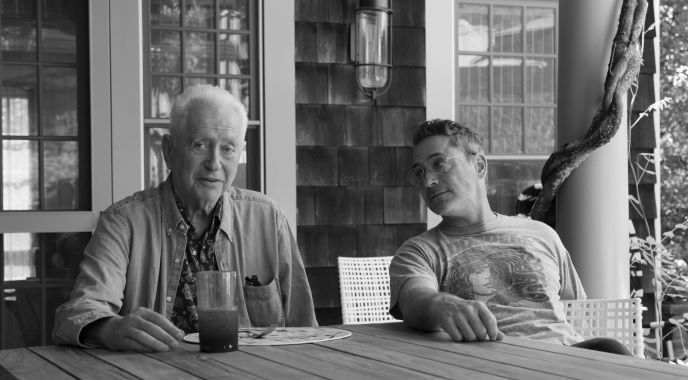Robert Downey Jr. doesn’t need an introduction. He is, after all, the most recognizable face of the most commercially successful film franchise, the man behind the iron suit—the first Avenger—and the real-life protagonist of one of the most remarkable comebacks (or redemption arcs, if you prefer) in recent Hollywood history.
What about the Sr. to his Jr.? Indeed, his lesser-known father, Robert Downey Sr., was a prominent and provocative figure of the countercultural movement of independent underground cinema from the late 1960s to the mid-’70s. He never achieved popularity as a mainstream filmmaker, and don’t feel guilty if you didn’t know about him or his movies since the Downeys are aware of that pitiful cultural oblivion. Here you have the reason and necessity for the documentary “Sr.,” directed by Chris Smith, a tribute to the patriarch in question.
Right from the beginning, in 2019, an enthusiastic Downey Jr. invites the camera to follow him inside his father’s home (who is in his eighties). It’s clear that the star is supervising the project. Downey Jr. and his wife Susan Downey are accredited as producers, and the testimonies here includes famous friends like Paul Thomas Anderson and Alan Arkin. Downey Sr. died in 2020 during the production of the film, making his death and its aftermath an instrumental part of the final result, deepening it as a contemplation of death and the purpose of lives dedicated to art.
Filmed in black and white, with the occasional interpolations in color thanks to fragments of films (mostly from Downey Sr.’s filmography and some starring Downey Jr.), “Sr.” introduces you to the peaceful ordinariness and charming camaraderie of the Downeys. It’s a portrait of a father and a son who respect and admire each other as artists, with cinema at the center of their relationship. Their chemistry together is magnetic, and their conversations, jokes, and confessions give the illusion of erasing the borders between the private and the public.
It’s apparent that the son, given his current status in the industry, wants to use his fame for the good cause of putting the focus on his father’s legacy. What better way to accomplish this than with a home movie streaming on Netflix that captures their final years and days together, while also operating as a traditional biopic covering the life and the work of someone exceptional. This mixture between the improvisational and the carefully planned creates a refreshing and emotive profile.
The most vital moments of “Sr.” come from the reminders of Downey Sr.’s reckless and avant-garde 1960’s DIY films, prime candidates for rerelease and critical reevaluation. Products of a tumultuous time, they offer a visual sample of the madness and excess described by Downey Sr. when referring to his youth and the bohemian environment of Lower Manhattan. Fragments from films as diverse as Putney Swope, Pound, Greaser’s Palace (among many others) highlight a chapter of cinema history thriving at the margins of the film industry with absolute freedom to be uncomfortable, funny, grotesque, and politically incorrect.
Back to the present, Downey Sr. directs his own version of the documentary until health complications debilitate him completely, and the tribute to the filmmaker transforms inevitably into a memorial. As an introduction to the work of Downey Sr., the documentary is instructive and makes you want to visit his irreverent films. As a biographical documentary, it’s a little sanitized, while not shy about the duo’s dark times (divorce, deaths, drug addictions that affected father and son alike). But as a celebration of the father-son relationship, it’s sublime.
You may wish that Netflix will accompany the release with a curated list of the director’s filmography on its platform, but the streaming model has taught us that it cares mainly about the present, even when it capitalizes on the past.

















Leave A Comment